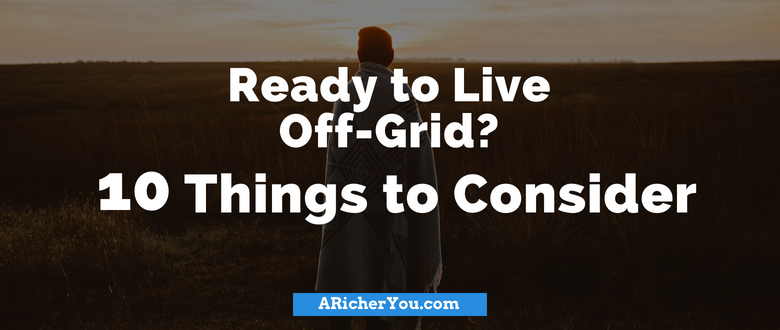Twenty years ago, I began living my life-long dream. I purchased a 5-acre property that was entirely off-the-grid.
My new home was in an area that had no access to the services that many folks consider normal… electrical power lines, water lines or sewer service. As I developed an increasingly sustainable lifestyle, I saved money and simultaneously, enriched my life.
Below are ten things to consider if you want to save money by going off-the grid and creating a more sustainable lifestyle.
1. Electricity – Use alternative energy
I have zero costs for electricity. My house came with two solar panels, two batteries, and a generator that I used quite a lot. Over the years, I have upgraded to a system with eight solar panels and eight batteries. I never run out of electricity now, and I have no back-up generator. The initial expense of installing a system can give you total freedom from electricity bills.

2. Should I use solar or wind energy? – Work with a knowledgeable and reputable technician
Solar systems – Not all panels are created equally. Know what you are getting. We all know that solar panels collect sunlight. However, the ones that I purchased collect on cloudy days, as well as on sunny days. Not all solar panels do this. Do your research.
Wind energy – I was certain that I wanted a back-up wind energy system on my property. Days without sun usually brought rain, and 90% of the time, wind. However, the solar technician, who also sold wind systems, told me that I didn’t have optimal wind currents and it would not be cost effective.
3. Heating Costs – Move to a warmer climate!
I used to spend hundreds of dollars on heating bills during winter months. Now I have no costs for household heat. Where I live, the temperature can drop into the 50’s on winter nights, and occasionally it dips into the 40’s. When it is chilly, I layer up, with a favorite sweater, and wear slippers or socks in the house. I have an electric blanket on my bed that I turn on for 15 minutes before I go to bed, making the bed toasty warm and inviting.
To heat water, I have an on-demand propane hot-water heater, which costs under $25 per month to run. I considered a solar hot water system, but found that they work great in the afternoon and evenings after a day of collecting sunlight, but the water is chilly in the mornings. I love my morning showers, so I allow myself this $25 per month extravagance!

4. Cooking and Refrigeration – Solar electric or propane?
Heating devices draw heavily from the solar bank, so an electric stove is not an option I will consider. I use a propane stove and a propane refrigerator, which together cost me around $70 per month in propane. My eight panel solar system might run an electric refrigerator, but as long as my propane refrigerator does the job, I won’t replace it.
An option to consider… there are electric powered refrigerators which switch automatically to propane-backup if the power in the battery bank drops to a point where it cannot meet the needs of the refrigerator.
5. Water – Catch it as it falls
There are different kinds of catchment systems. Where I live, there is enough rainfall for me to have a system that is not tied to roof collection. I have an open tank with a cloth cover to keep debris and critters from getting into it. Many people use roof gutters to collect rainwater and divert it into their catchment tank. Either way, put a good filtration system in place, and test your water to be sure it is safe if you plan to drink it.
My water pump, which provides water pressure to the house, is electric. I heat my hot water with a simple on-demand propane hot water system that works wonderfully.
6. Food – Grow your own, buy local, know your farmer
Grow your own: This not only radically cut food costs, but it has additional benefits. You know what you are getting! Personally, I don’t want to eat GMO’s or foods laden with chemicals, preservatives and additives. I can eliminate these by growing my own produce. Additionally, I know that freshly harvested foods provide us with the living nutrients that are so important to us.
Buy local, know your farmer: Farmer’s Markets are a main source for providing foods that I don’t produce for myself. I know each of the vendors, and I know how the food I am eating is produced. I can get cheese, breads and other baked goods, honey, coffee, milk, eggs, meats, fish, fruits and vegetables… all while enjoying the pleasant atmosphere of the farmer’s market.

7. Composting toilet – Easy to install, easy to use
A composting toilet uses no water, and therefore no electricity to pump the water.
Used correctly, with carbon-based material such as sawdust or mulch added periodically, it provides a product that can be used to fertilize crops that are not producing foods. It is important to check with local requirements regarding installation and use of the end-product.
8. Consumption – Use less, waste less, need less
Whether we are talking about electrical energy, gasoline, clothing, etc., I have become conscious of my use of resources, of the difference between wants and needs, and of reducing waste.
For example, with regard to electricity, I run electrical appliances when I am using them. I have music playing most of the time when I am home, and I spend a great deal of time on the computer. However, I don’t leave lights on in parts of the house that I am not using, and I don’t leave music playing when I leave the house.
9. Downsizing – Find the size that meets your needs
My last on-the-grid home about 2600 sq ft in size. My off-the-grid homes have ranged from 1400 sq ft to 400 sq ft. I have found that, for me, around 800 sf is optimal. I an open Kitchen/living room, an office, two bedrooms, and one bathroom.
Decide what you really want and need in your home, and downsize to eliminate wasted or unnecessary space.

10. Find or help to create a community of like-minded people and barter
People within my community will trade for chiropractic, massage, and acupuncture.
I know people who make essential oils, dry spices, make chocolate from cacao, do web-design, sewing, and auto-repair work…. all willing to barter for some service or product that they need. This not only saves me money, it also enriches my life by growing my connection to my community.
Would you live off grid? Share your thoughts below.
Written by Cynthia Waymegwance.



Absolutely I would live off grid. Need a push start and someone with a little wisdom to guide me.
That’s great Cheryl! And I agree. Having a bit of wisdom from someone who knows what they’re doing would be incredibly helpful for this transition.